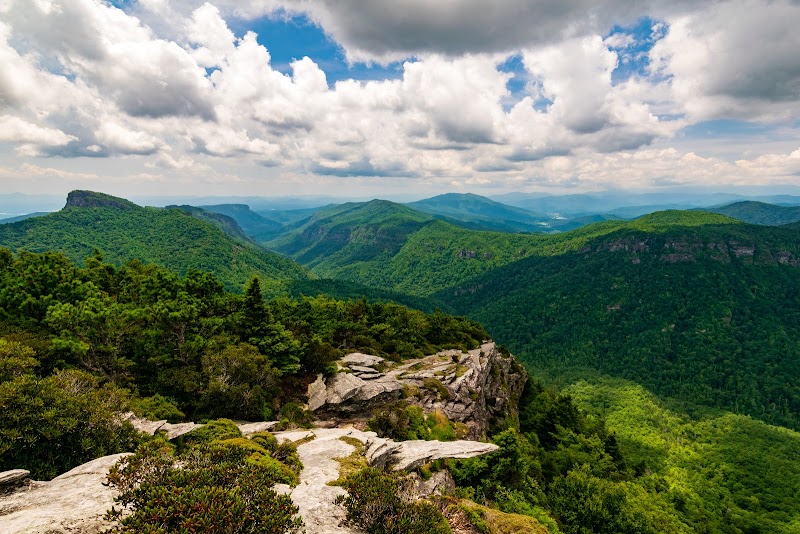
eco-tours near Boone, North Carolina
Eco-tours near Boone, North Carolina are limited, but the area offers ample opportunity for self-guided responsible adventures in the Blue Ridge Mountains. Discover how to connect with Boone’s wild environment through practical outdoor activities and where to find sustainable experiences nearby.
Opt for local guides emphasizing sustainability
Even without formal eco-tours, some local outfitters prioritize environmental education and conservation; research and choose those for a responsible outdoor experience.
Pack reusable water and snacks
Minimize single-use plastics to protect Boone’s rivers and trails; hydration is critical, so bring a refillable bottle.
Wear sturdy footwear for rugged terrain
Trails around Boone can be steep and uneven—hiking boots with solid grip provide safety and comfort on rocky or muddy paths.
Start early to avoid afternoon storms
Thunderstorms often roll in later in the day—begin activities early to stay safe and maximize daylight exploration.
eco-tours near Boone, North Carolina
Explore Eco-Tours Near Boone, North Carolina
Boone, North Carolina is a gateway to the Blue Ridge Mountains and offers plenty for adventure seekers, but when it comes to dedicated eco-tours—organized trips that center on environmental education and conservation awareness—they're notably rare or nonexistent in this region. While Boone excels in outdoor activities like hiking, mountain biking, and river paddling amid a richly biodiverse landscape, guided eco-tour experiences specifically branded as "eco-tours" are unavailable locally.
This absence is not for a lack of natural beauty or ecological interest. The forests here are alive with species ranging from the shy salamanders beneath mossy logs to the soaring hawks above the ridges. The New River meanders with a restless spirit, daring visitors to respect its fiercely ancient currents, and the sharp crestlines challenge hikers in their rugged authenticity. However, structured eco-tours—programs designed to promote sustainable travel with expert-led interpretation—aren't part of the Boone outdoor itinerary.
For travelers keen on immersive environmental experiences, Boone’s rich trails and protected areas provide opportunities for self-guided exploration with a responsible mindset. Nearby Boone, one can visit sites like the Blue Ridge Parkway’s overlooks and natural centers where stewardship and nature converge informally. Interpretive signage, conservation projects, and community-driven educational programs are scattered through the region but lack the formal eco-tour structure found elsewhere.
If eco-tours are the primary goal of your trip, expanding your search beyond Boone will be necessary. Meanwhile, Boone offers robust adventure options that respect and showcase the region’s natural forces. Our webpage below highlights the best Boone adventures for outdoor enthusiasts, including hiking, water sports, and mountain biking, perfect for blending thrill with environmental respect.
For those who want to explore Boone through the lens of its natural heritage—even without official eco-tours—consider guided hikes from local outfitters who emphasize sustainable practices or visiting conservation areas where you can engage with the landscape firsthand. Dive into the adventure opportunities listed on our page to plan a trip that honors the wild and fiercely authentic character of Boone, North Carolina.
Nearby Trips
All Adventures
Boat Charters
Water Activities
Adventures near Boone, North Carolina
Discover the unique and memorable adventures that make Boone, North Carolina special.
Frequently Asked Questions
Are there organized eco-tours available directly near Boone, North Carolina?
Currently, there are no dedicated eco-tours operating specifically in the Boone region. Visitors interested in sustainable nature experiences generally engage in self-guided exploration or participate in other guided outdoor activities focusing on adventure rather than eco-tourism.
What is the best way to experience Boone’s natural environment responsibly?
Visitors should follow Leave No Trace principles, use designated trails, and consider local guiding services that emphasize sustainability and conservation-minded practices even if they don't label themselves as eco-tours.
What nearby locations offer traditional eco-tour experiences if not Boone itself?
For formal eco-tours, travelers might look to the Great Smoky Mountains National Park or other parts of western North Carolina and Tennessee, where conservation-focused tours are more common.
What wildlife might I encounter exploring Boone’s outdoors?
Expect to see white-tailed deer, eastern box turtles, various songbirds, and occasional sightings of black bears or red foxes, all acting as vibrant characters in the ecosystem.
When is the best season to visit for scenic beauty?
Fall is particularly renowned for its dramatic foliage, offering some of the best visual encounters with the forest’s changing colors, while spring brings fresh blooms and renewed life.
What safety tips should I keep in mind while hiking near Boone?
Come prepared with adequate footwear, layered clothing, and water. Watch weather reports as afternoons can bring rainstorms, and inform someone of your plans to ensure help is available if needed.
Recommended Gear
Hiking boots
Supports ankles and provides traction on rocky, slippery trails common around Boone.
Hydration system
Regular water intake is necessary, especially on hot days or high-effort hikes.
Layered clothing
Allows you to adjust to fluctuating temperatures from chilly mornings to warm afternoons.
Rain jacket
Keeps you dry during frequent spring showers and wet trail conditions.
Local Insights
Hidden Gems
- "Hawksbill Mountain for less crowded panoramic views"
- "Edgemont Loop Trail with its streamside passages"
- "Green Knob Overlook for sunrise vistas"
Wildlife
- "Eastern hellbender salamander in mountain streams"
- "Pileated woodpecker drumming on dead trees"
- "Hummingbirds frequently visiting wildflower patches"
History
"Boone’s area has deep ties to Appalachian heritage, with early settler routes and Cherokee history influencing the landscape’s stories and stewardship values today."
